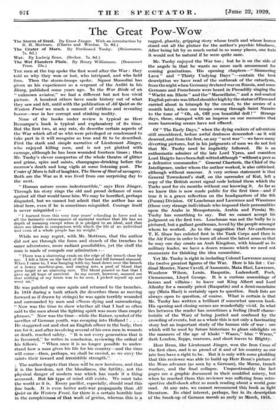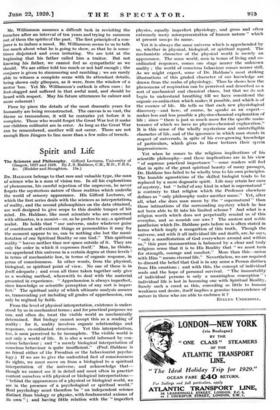The Great Pow-Wow
War. By Ludwig Henn. (Seeker. 78. 6d.) TAE men at the top spoke the first word after the War : they told us why they won or lost, who intrigued, and who held firm. Then the storm-troops spoke. Signor Mussolini has given us his experiences as a sergeant of the Arditi in his
Diary, published some years ago. /n the War Birds of an
" unknown aviator," we had a different but not less vivid Picture. A hundred others have made history out of what
they saw and felt, until with the publication of All Quiet on the Western Front we reach a summit of ruthless and revealing horror—war in her corrupt and stinking nudity.
None of the books under review is typical as Herr Remarque's book is typical and explanatory of its time.
But the first two, at any rate, do describe certain aspects of the War which all of us wilt, were privileged or condemned to take part in it will recognize as true and fit to be described.
First the stark and simple narrative of Lieutenant Jiinger, who enjoyed killing men, and is not yet glutted with carnage, although he has been wounded fourteen times ; then Mr. Tuohy's clever conspectus of the whole theatre of glitter
and grime, spies and saints, champagne-drinking before the morrow's death and long vigils at some listening post. The Crater of Mars is full of laughter, The Storm of Steel of savagery. Both are the War as it was lived from one surprising day to
the next.
" Human nature seems indestructible," says Herr Jiinger.
Through his story rings the old and proud defiance of man against all that would tame him. We may be horrified, perhaps
disgusted, but we cannot but admit that the author has an ideal here, even if he is sometimes misguided. Courage itself is never misguided :— •
" I learned from this very four years' schooling in force and in all the fantastic extravagance of material warfare that life has no depth of meaning except when it is pledged to an ideal, and that there are ideals in comparison with which the life of an individual
and oven of a whole people has no weight. . . •
While we may regret, with Mr. Mottram, that the author did not see through the fume and stench of the trenches to saner adyentures, more radiant possibilities, yet the stuff the mansis made of compels our admiration :— " There was a shattering crash on the edge of the trench close by xne. I felt a blow on the back of the head and fell forward stunned. Wheel .came to, I was hanging with my head down over the breech of a heavy machine-gun, and staring into a pool -of blood that grew larger at an alarming rate. The blood poured so fast that I gave up all hope of survival. As my escort, however, assured me that nothing of my brain was to be seen, I picked myself up and went on."'-
He was patched up once again and returned to the trenches. In 1918 during a tank attack (he describes them as moving forward as if drawn by stringS) he was again terribly wounded and surrounded by men and officers dying and surrendering. " Now was the time to show whether all that I had so often said to the men about the fighting spirit was more than-empty phrases." Now was the time—while the Kaiser, symbol of the
sacrifice of German youth, was escaping into Holland
He staggered out and shot an English officer in the body, then
ran for it, and after involving several of his own men in Wounds or death, reached safety. " It is not every generation that is so favoured,"' he writes in conclusion, reviewing the ordeal of his fellow's. " When once it is no longer possible to under-. stand how a man gives his life for his country—and the time will come—then, perhaps, we_shall be envied, as we envy the saints their inward and irresistible strength." _ _
/ The author forgets that there will be new heroisms, and that it is the boredom, not the bloodiness, the futility, not the physical danger of modern war which has Made it a thing accursed. But his type of mind still 'exists. We must take the world as it is. Every pacifist, especially, should read this
fine book. It is even better anti-war propaganda than All Quiet on the Western Front, for there is a certain horrible lure in the completenesa Of that woik. of genius, Whereas this is a
ragged, ghastly, gripping story whose truth and whose horror stand out all the plainer for the author's psychic blindness. After being hit by so much metal in so many places, one feels it -would not be natural if he were quite sane.
Mr. Tuohy enjoyed the War too ; but he is on the side of the angels' in that he wants no more such amusement for coming generations. His opening chapters—" Simmering Lava, " and " Thirty Undying Days "—contain the best description we 'have read of the outbreak of the cataclysm, from the night when Germany declared war on Russia, and some Germans and Frenchmen were heard in-Piccadilly singing the " Wacht am Rhein " and the " Marseillaise," and a red-coated F.nglish private was lifted shoulder high by the statue of Eros and carried about in triumph by the crowd, to the scenes of a month later, when our troops swung through Saint Nazaire to the tune of " Oh, oh, OH you beautiful doll ! " Strange days, these, stamped with an impress on our memories that
more harrowing scenes have not effaced. • -' Of " The Early Days," when the dying embers of adventure still smouldered, before awful drabness descended—as it will descend, and from the first, on any " next war "—we have many diverting pictures, but in his judgments of men we do not feel that Mr. Tuohy need be implicitly followed. He is an enthusiastic admirer of the late Lord Ypres, and considers Lord Haig to have been dull-witted although "without a peer as a defensive commander." General Charteris, the Chief of the Intelligence, under whom the author worked, is also criticized, although without rancour. A very serious statement is that General Townshend's staff, on the surrender of Kut, left a copy of the British secret signal code behind them which the Turks used for six months without our knowing it. As far as we know this is now made public for the first time—and if true it is a grave reflection on the headquarters of the 6th (Poona) Division. Of Leachman and Lawrence and Wassinuss (those very strange individuals who imposed their personalities upon the Arabs in Mesopotamia, Arabia and Persia) Mr. Tuohy has something to say. But we cannot accept his judgment on the first two. Leaehman was not the bully he is pictured, but a gallant gentleman, loved by the people amongst whom he worked. As to the suggestion that Mr-craftsman T. E. Shaw has enlisted first in the Tank Corps and then in the Ail: Force in order to learn all about the latest arms so that lie may one day create an Arab kingdom, with himself as its military leader, we have a dozen reasons which we need not enumerate for thinking the idea moonshine.
Yet Mr. Tuohy is right in including Colonel Lawrence among the twelve greatest figures of the War. Here is his list : Car- dinal Mercier, Nurse Cavell, d'Annunzio, Math Hari, Lawrence, Woodrow Wilson, Lenin, Rasputin, Ludendorff, Foch, Clemenceau, Lloyd George. It is a curious assemblage of heroes and villains : to leave out King Albert and Lord Allenby for a rascally priest (Rasputin) and a demi-mondaine spy (Mats Hari) is certainly open to question. Such lists are always open to question, of course. What is certain is that Mr. Tuohy has written a brilliant if somewhat uneven book. His opening and closing scenes are wonderfully vivid. In what lies between the reader has sometimes a feeling (itself charac- teristic of the War) of being jostled and confused by the crowding of events, but as a whole this is not only a fascinating story but an important study of the hunian side of war : one which will be used by future historians to glean sidelights on the manners of the age of khaki " Waaes," blue " Wrens," dark London, Zepps, maroons, and short leaves to Blighty.
Herr Renn, like Lieutenant Jiinger, won the Iron Cross of the first class, and is as proud of it and of his country as our late foes have a right to be. But it is only with some plodding that this reviewer was able to build up Herr Renn's picture of the Mons advance (as seen by a German), the Marne, trench warfare, and the final collapse. Unquestionably the last pages are a graphic document in their muddled misery, but when he reached them this reviewer was suffering from retro- spective shell-shock after so much reading about a world gone mad. At any rate, we cannot recommend this book as light literature. Its chief interest, perhaps, lies in its description of the break-up of German morale as early as March, 1918. Mr. Williamson assumes a difficult task in revisiting the trenches after an interval of ten years and trying to summon out of them the spirits of the past. The first principle of a con- jurer is to induce a mood. Mr. Williamson seems to us to talk too much about what he is going to show, so that he is some- times disjointed and even irritating. We are told at the beginning that his father called him a traitor. But not knowing his father, we cannot feel as sympathetic as we should. We are either told too much or not half enough ; the conjurer is given to stammering and rambling ; we are rarely able to witness a complete scene with its attendant details, being shown only glimpses, as it were, from the window of a motor 'bus. Yet Mr. Williamson's outlook is often ours : he foot-slogged and suffered in that awful mud, and should be heard with respect. May his future utterances be calmer and more coherent
Piece by piece the details of the most dramatic years for humanity are being reconstructed. The canvas is so vast, the theme so tremendous, it will be centuries yet before it is complete. Those who would forget the Great War lest it make our children militarist are in error. As long as the Great War can be remembered, another will not occur. There are not enough Herr Jungers to line more than a few miles of trench.













































 Previous page
Previous page